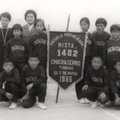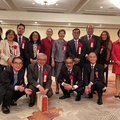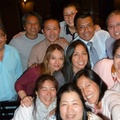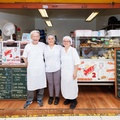The Okuyama family is one of the few Nikkei families in Peru that are fortunate to have an Issei at home. Motome Okuyama turned 101 on November 7, 2015 in top form: she sings, writes, cooks, plays gateball, sews, goes shopping alone and is able to perform 64 songs by heart.
Its dynamism and versatility seem to come from a source of vitality that the years do not exhaust. There are already 76 who have been in Peru. He arrived in August 1939 on the Heiyo Maru . The following month, World War II broke out. Japan was already at war with China and anti-Japanese sentiment was expanding in Peru. Hard times.
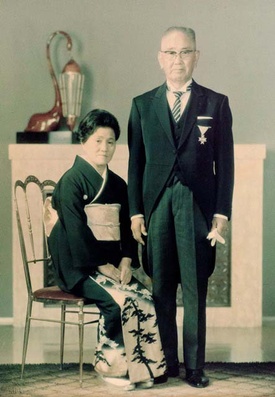
Motome was born in Yamanashi, the same prefecture where her husband Kajyu was originally from. He had migrated to Peru much earlier (in 1918) and started a family, but was widowed. He returned to Japan in search of a wife, married Motome and when they arrived in Peru in 1939 they were carrying their eldest daughter Mercedes, less than half a year old.
If the year in which the war began was hard, the year that followed was worse. On May 13, 1940, Japanese businesses were victims of looting in a climate of hostility that escalated as the war progressed. Since Peru was aligned with the United States, the Japanese belonged to the enemy side. The Okuyamas, who had two stores selling imported Japanese products in the Central Market, closed their stores before the mob arrived. The façade was damaged, but the police arrived in time and the rioters took nothing.
Just eleven days later, an earthquake shook the country. A noodle factory that Kajyu had in Callao collapsed. However, what the obaachan remembers most is that some Peruvians said that God was punishing them for having mistreated the Japanese.
Kajyu was on the blacklist of Japanese to be deported to internment camps in the United States. He was arrested, but was saved thanks to high-level contacts.
The Okuyama businesses did not emerge unscathed from the war, but Kajyu, a tenacious entrepreneur and pioneer in the importation of Mister bicycles from Japan, managed to overcome and prosper.
DISCREET AND GENEROUS
His children remember him as a discreet and quiet man who avoided public appearances. So discreet that, for example, the family found out that he had made a donation to a school by reading the newspaper Perú Shimpo.
When he died, a lady that no one in the family knew showed up at the wake to express her condolences and gratitude. That day, the whole family found out that when the woman was widowed and ran out of money to pay for her son's education at La Victoria school, Kajyu supported her. “He was generous, he didn't like to attract attention,” says his daughter Mercedes.
His daughter Carmen, who has been president of the Peruvian-Japanese Women's Association (Fujinkai), remembers that her father donated the water tank to the La Unión school and had it fenced.
“He sold quite a few bicycles and gave money to La Victoria,” the obaachan intervenes. He also made contributions to the José Gálvez school. Education was important to him, because at school the future of children begins to be forged.
At home, Mercedes remembers him as an authoritarian father with a strong character. What he ordered was followed without question. However, the youngest daughter, Patricia, whom Mercedes has been with for 15 years, says that he was not so strict with her. The years made the father more flexible; The world in which he had raised his older children was no longer the one in which the younger ones grew up.
As the Japanese used to do in those times, he educated by example, not by words.
His son Kaichi remembers that when an accident or mishap of any kind occurred, he was not the kind of man who, in anger, raised his finger to point blame and sentence, but rather he worried about the condition or health of those involved. Kaichi always has that in mind and has passed it on to his children.
Carmen evokes another facet of her father: history sensei. “We learned the history of Peru with him,” he says. When they needed information about the government of Augusto Leguía or the murder of Luis Sánchez Cerro, they turned to him as a privileged source who was a direct witness of the events.
The last word about Kajyu goes to the obaachan , who highlights two qualities of her husband: “Good people” and “businessman.”
“SMALL, BUT POWERFUL”
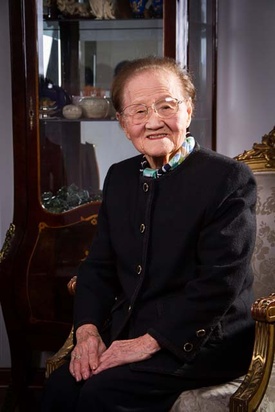
The reconstruction of the history of the Okuyama family in Peru, which spans almost a hundred years, is a joint task in which everyone links their memories, shares them, complements, corrects, laughs or is surprised, because there are aspects of the life of the obaachan and her husband that some of their descendants, especially the grandchildren and great-grandchildren, were unaware of.
All attention is focused on the obaachan. She is the story of the family. It could be defined in many ways, but perhaps none does it as much justice as the one that her daughter Carmen shares with everyone: “Superobaachan.”
“Small, but powerful,” Kaichi adds with a laugh. “It's a miracle that it's unique,” says Patricia.
His children agree in highlighting his independent spirit. “She says 'I can' and she does it,” says Kaichi, who says that sometimes her mother goes out alone and takes a taxi to the Peruvian Japanese Cultural Center or walks to the Metro supermarket.
“I open the refrigerator, what does it have, ah, that's missing, so I'm going to buy it alone,” says the obaachan.
Carmen highlights that her mother's desire not to depend on anyone, to fend for herself, keeps her active and in good health. “It is an example that we have at home. That is living, with quality of life.”
The obaachan, who records everything that happens to her in her diary, usually says that if her mind works she will not suffer from senile dementia.
On Mondays he attends the APJ's Ryoichi Jinnai Recreation Center (where seniors gather for activities and socialize) and leads an intense social life. “Too much, more than everyone,” his children say, laughing.
His multifaceted nature is enviable: he won an international karaoke competition in Nagoya, represented Peru in gateball tournaments in Brazil, Hawaii and South Korea, and did theater at Fujinkai for twenty years, even writing scripts.
The admiration that her children feel for her is manifested not only in words, but also in the emphasis with which they are pronounced, in their looks, in their smiles, in the emotional complicity they generate and radiate to others. But there was someone who surpassed them.
“My dad was my mom's number one fan,” says Mercedes. Kajyu encouraged Motome to sing, to participate in competitions, to act, and supported her when she was president of Fujinkai, aware of the responsibility that her position entailed.
The obaachan always thinks of others. His son Pedro reveals that he gives each of his grandchildren and great-grandchildren an envelope with money on their birthday. Her daughter Nelly emphasizes how detailed she is, she leaves nothing to chance. The envelope per se is a gift. It does not use an ordinary white envelope, but rather a packaging with a design, decoration, origami, any detail that makes it special.
Even though her grandchildren are now adults and working, their grandmother never forgets to give them her envelope.
“Every month one hundred soles, it takes a lot of money,” says the obaachan, smiling.
“My obaachan is a super example for all of us, it is a support to have her as a grandmother,” says her granddaughter Midori.
“You receive his affection, he makes you feel like you are still a child, he makes you feel that someone cares about you. It is always pending, calling you. She welcomes you with the food you like, she makes you feel like she is another mother you have,” says her granddaughter Nancy.
Although in the transition from one generation to another certain teachings are diluted or modified, there are other non-negotiable ones, which remain unchanged in the Okuyama family. The main one is respect for the elderly.
Always ask please and then say thank you, adds Carmen.
A custom that has permeated the Okuyama family since the grandparents and that the grandchildren practice is to always arrive with something when they visit a house. “Never arrive empty-handed,” says Gerardo, one of the grandchildren.
Although the Japanese language has not been transmitted in most Nikkei homes, the custom of using some Nihongo words in everyday communication is still maintained. When you are a child, however, accustomed to hearing certain terms in Japanese at home, you sometimes do not perceive the difference between one language and another, and use them at school believing that they are words in Spanish, causing confusion that later becomes nice anecdotes. That happened with one of the obaachan's great-grandsons, who in the nest said “makura” to refer to the pillow.
Another custom they maintain are family gatherings. There are unmissable events on the calendar: Mother's Day, the birthday of the obaachan , Christmas and New Year. And occasions like this, an interview to tell the family's story, are an opportunity to strengthen ties through stories that are remembered not with sadness for what no longer exists, but with joy for what is shared.
DATA
- There are seven children of Kajyu and Motome Okuyama: Mercedes, Carmen, Kaichi, Rosa, Pedro, Nelly and Patricia. With his first wife, Kajyu had three children. One of them was adopted by an uncle, and the remaining two, Teruo and Kengo, consider Motome their mother. Both were taken by their father to Japan, where they remained during the war. Years later they returned to Peru and joined the family.
- Kajyu was assigned to the Esquivel hacienda (Huaral) when he first arrived in Peru. It did not take him long to become independent to dedicate himself to commerce, venturing into a wide variety of areas, especially the importation of Japanese products. He was in charge of supplying food – such as kamaboko – at events in the Japanese colony.
- Motome and Carmen form the first case of mother and daughter presidents of Fujinkai.
- Kajyu was decorated by the government of Japan and received recognition from the Ministry of Education of Peru.
- Motome has also been decorated by the Japanese government. When then-Princess Sayako came to Peru in 1999 for the centenary of Japanese immigration to Peru, she spoke on behalf of the Issei during a reception held in her honor.
* This article is published thanks to the agreement between the Peruvian Japanese Association (APJ) and the Discover Nikkei Project. Article originally published in Kaikan magazine No. 101, and adapted for Discover Nikkei.
© 2015 Texto y fotos: Asociación Peruano Japonesa



